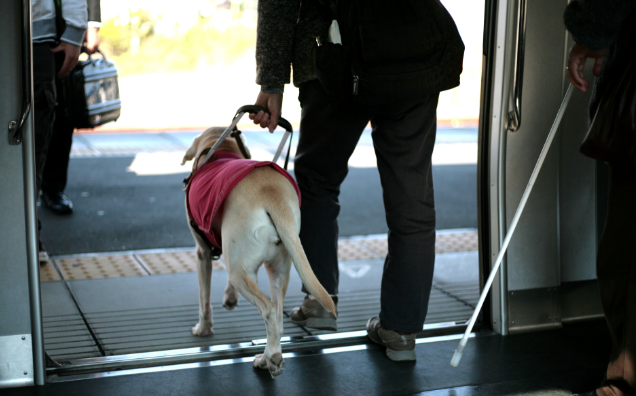- TOP >
- Efforts of Kushikatsu Tanaka Holdings
Efforts of Kushikatsu Tanaka Holdingss Towa Higashi-Gotanda Bldg. 5F, 1-7-6 Higashigotanda, Tokyo
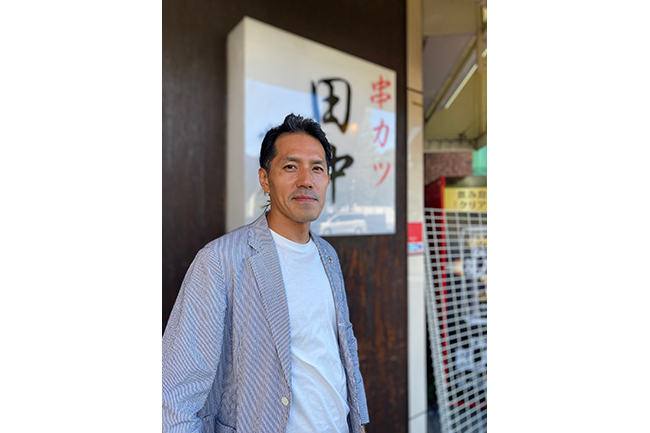 Toshio Sakamoto, CEO
Toshio Sakamoto, CEO
- Level difference at entrance is two steps; height is 18cm
- Width of entrance into restaurant is 90cm
- Width of restroom entrance is 59cm, with sliding door (while width is narrow, smaller wheelchairs can pass)
This is some of the barrier-free information published on the nationwide barrier-free information search site, Heart Barrier Free Project (Japanese only), for Kushikatsu Tanaka Setagaya, the first branch of the Kushikatsu Tanaka restaurant chain, which has opened 103 branches within Tokyo and 318 across Japan. (Information correct as of December 2023.)
We spoke to company president and CEO Toshio Sakamoto about the barrier-free efforts at his restaurants.
 Toshio Sakamoto, CEO
Toshio Sakamoto, CEO
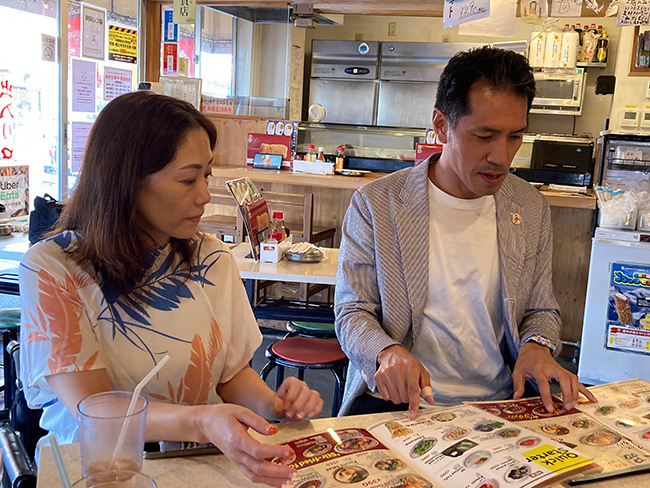 Kimie Ikeda & Toshio Sakamoto
Kimie Ikeda & Toshio Sakamoto
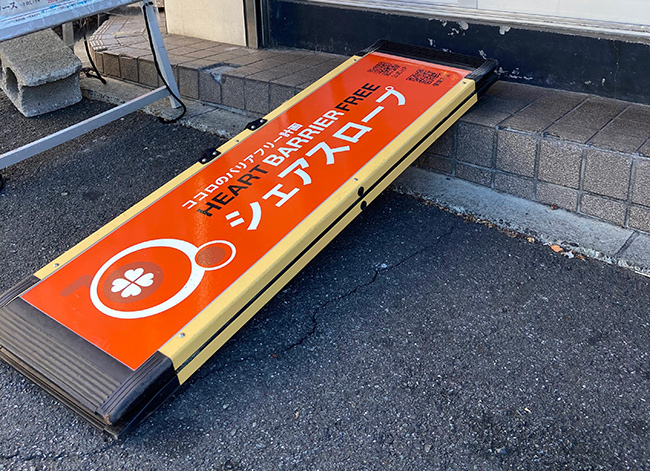 Share Slope
Share Slope
The event that led to us working on barrier-free efforts
Kushikatsu is a traditional low-cost and tasty dish of deep-fried ingredients on skewers that originated in Osaka, with each family and restaurant preserving their own secret recipe. The Setagaya branch of Kushikatsu Tanaka was the first of the company’s branches, opened in December 2008. It wouldn’t be an exaggeration to say that our company’s barrier-free efforts began here, after then restaurant manager and former company president Keiji Nuki (now chairperson) met Kimie Ikeda, chairperson of the NPO Heart Barrier Free Project (website manager of the above-mentioned Heart Barrier Free Project) and wheelchair user.
I’ve heard, when Ms. Ikeda visited our restaurant, she was on the verge of despair due to having been refused service by cab drivers and turned away from restaurants, and she nervously asked if she could enter our restaurant in a wheelchair while feeling apprehensive that she would be turned away again. Despite this being Nuki’s first experience welcoming a customer in a wheelchair, he replied, “It’s no problem!” and helped guide Ms. Ikeda’s wheelchair to her table while saying, “A customer is coming through.” Ms. Ikeda was so touched by the “friendly restaurant” and “kind people” after witnessing not only the staff, but also fellow diners come together to help move tables and chairs, that she has since become a regular customer. It was through this experience that Nuki came to understand for the first time the current situation for people navigating the world in wheelchairs. Realizing the importance of promoting accessibility, something he had never once thought about up until that point, he began creating restaurants in consideration of barrier-free efforts from the opening of the second branch onward.
In general, the number of seats in restaurants in the same category as ours is directly related to sales, so we would ideally have as many seats as possible. Having said that, our company’s motto is to “accommodate customers as much as possible” without passing on costs through our products and services, and it is standard practice in other lines of our business as well to consider accessibility from the store design stage. While some of our branches have spacious restrooms that are easy for both wheelchair users and customers with young children to use, not all branches have barrier-free facilities available, with some having steps or smaller restrooms. In that case, we are providing a “barrier-free mindset” through the hospitality (omotenashi) of our staff.
We began using the “Share Slope* (see photo),” a mobility ramp developed by Heart Barrier Free Project, at our restaurants in July 2022, with a plan to introduce it at five more branches each year. Until now, staff had to lift up or otherwise transport wheelchairs to allow wheelchair users to enter and exit our restaurants. However, the Share Slope makes it easier for customers using wheelchairs to enter to do so, in addition to customers with strollers.
*This device was developed with the hope that it would incentivize wheelchair users to go out more, and “share” was added to the name with the expectation that it would be lent out and borrowed among stores.
 Kimie Ikeda & Toshio Sakamoto
Kimie Ikeda & Toshio Sakamoto
 Share Slope
Share Slope
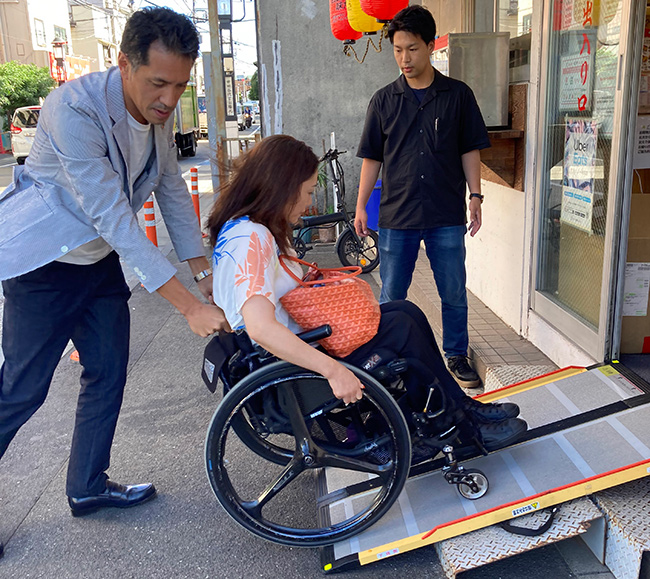 Barrier-free Slope
Barrier-free Slope
The presence of staff members who realize a barrier-free mindset
Since our establishment, we have upheld the corporate philosophy of “contributing to society by making as many people as possible smile with kushikatsu and pursuing the physical and spiritual well-being of all employees.” To realize this philosophy, I have been expanding the concept of “omotenashi” toward customers as a priority effort throughout the company since taking over as president in June 2022. Omotenashi toward customers encourages them to show their gratitude and give feedback to staff, such as, “It was delicious,” and “I’ll come again!”: in other words, spiritual compensation. We believe that this will lead to growth due to the increased motivation and satisfaction of staff. Growth of our staff and restaurants is financial compensation connected with increased sales and salaries. This is the cycle that will allow us to realize our management philosophy.
Our company has a training program called Kushikatsu Tanaka Academy (KTA), where new employees learn about our management philosophy, corporate history, and general common knowledge, as well as the basics of handling complaints and guidance on using social media, in a classroom setting. The program also includes “barrier-free training,” with a “wheelchair experience” provided as part of this. Even staff members who have never operated a wheelchair before are able to experience firsthand how it works, which will help them to better assist customers at our restaurants. Moreover, we also have a framework for employees to learn on the job before being assigned to a branch, with actual restaurants used as a “training restaurant.” Under the guidance of instructors, trainees acquire the mindset of “omotenashi” by experiencing it in word and deed; I feel positive that this is what has firmly instilled this mindset in each one of our staff members.
 Barrier-free Slope
Barrier-free Slope
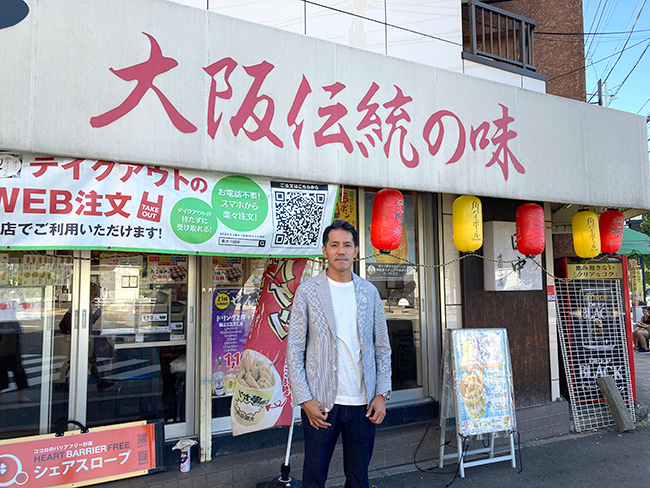
Friendly restaurants attract kind customers
The other day, after Ms. Ikeda visited our Shinjuku 3-chome branch with friends, she contacted us to let us know that she had felt a sense of cooperation and kindness not only from restaurant staff, but also from customers. What personally made me happy was knowing that this experience helped remove the “psychological barriers of going out” for Ms. Ikeda’s friend, who was also a wheelchair user and rarely went out to eat (thinking it was impossible).
These days, Kushikatsu Tanaka is not only an izakaya for adults, but also serves as a family-friendly establishment, so we are also rolling out roadside branches. After banning smoking at all our branches in 2017, we have seen an increase in families with young children in our restaurants. Moreover, we have begun offering menus and an app that allow customers to order in English following a steady rise in the number of overseas customers due to inbound tourism. Understanding that our customers face many different circumstances, whether disabled or not, we continually strive to serve each customer with the spirit of omotenashi through our words and actions.

 social media accounts
social media accounts
Tokyo, a city that is accessible everywhere to anyone.
Sightseeing where you wish, as you wish.
This ability to travel anywhere you please makes life that much richer.
Tokyo welcomes your visit.
Here you can encounter tradition,
history, culture, nature, technology,
and, best of all, smiling faces.
Making tourism closer and more
enjoyable through accessible tourism.




